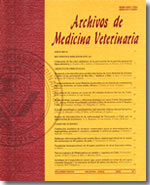Evaluation of fresh and frozen canine semen by the hypoosmotic swelling test
Main Article Content
Abstract
Twenty ejaculates from 5 adult dogs were collected by digital manipulation, in order to study the functional capacity of spermatozoal membranes in fresh and frozen/thawed semen. The average volume obtained was 1.9 ± 0.87 ml (1 and 2 fractions). The progressive motility, live and normal sperm were 83.3%, 92.0% and 83.5%, respectively. The average concentration was 325 x 106 sperm per ml. Semen samples were exposed to an hypoosmotic solution (55 mOsm/L) observing 87.9% of spermatozoa with curved tails. After evaluation, 18 ejaculates were extended with a TRIS-fructose-citric acid diluent containing 20% egg yolk and 8% glycerol, added to the semen to obtain 150 x 106 spermatozoa per ml. The samples were packaged in 0,25 ml straws and kept for 2 hours at 5ºC for equilibration and then frozen in liquid N2 vapour for 8 min. before submirge them into liquid N2. The samples were stored in liquid N2 for 2 to 9 weeks. Straws were thawed in water bath at 40ºC for 15 sec. and evaluated. The progressive motility was 47.4 ± 17.6% and spermatozoa with curved tails reached 53.7%. The correlation obtained in frozen/thawed semen between progressive motility and HOST was significant r = 0.88 and higher (p<0.01) than the value obtained with fresh semen (r = 0.66), indicating a close relationship between this characteristic and potential fertility. The HOST showed to be a simple technique to evaluate the integrity of spermatozoa membrane in fresh and frozen/thawed canine semen.

